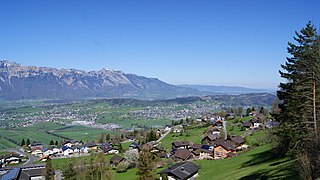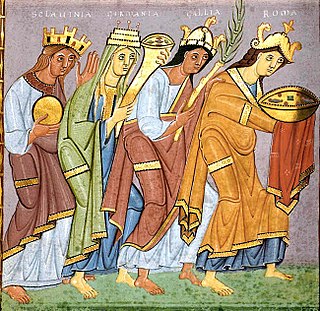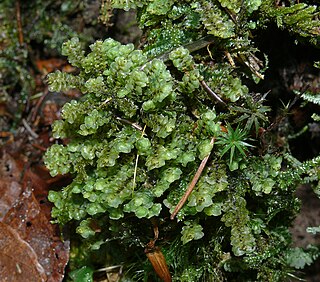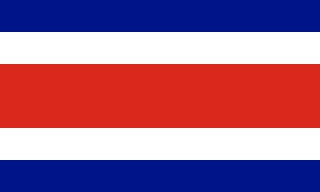
Anthocyanidins are common plant pigments, the aglycones of anthocyanins. They are based on the flavylium cation, an oxonium ion, with various groups substituted for its hydrogen atoms. They generally change color from red through purple, blue, and bluish green as a function of pH.

The Curta is a hand-held mechanical calculator designed by Curt Herzstark. It is known for its extremely compact design: a small cylinder that fits in the palm of the hand. It was affectionately known as the "pepper grinder" or "peppermill" due to its shape and means of operation; its superficial resemblance to a certain type of hand grenade also earned it the nickname "math grenade".

Samo founded the first recorded political union of Slavic tribes, known as Samo's Empire, ruling from 623 until his death in 658. According to Fredegarius, the only contemporary source, Samo was a Frankish merchant who unified several Slavic tribes against robber raids and violence by nearby settled Avars, showing such bravery and command skills in battle that he was elected "King of the Slavs". In 631, Samo successfully defended his realm against the Frankish Kingdom in the three-day Battle of Wogastisburg.

Mauren is a municipality in Liechtenstein that is situated in the north of the country. It has a population of 4,401. The Curta mechanical calculator was produced by Contina AG, in Mauren.

The West Slavs are Slavic peoples who speak the West Slavic languages. They separated from the common Slavic group around the 7th century, and established independent polities in Central Europe by the 8th to 9th centuries. The West Slavic languages diversified into their historically attested forms over the 10th to 14th centuries.
The Early Middle Ages in Romania started with the withdrawal of the Roman troops and administration from Dacia province in the 270s. In the next millennium a series of peoples, most of whom only controlled two or three of the nearly ten historical regions that now form Romania, arrived. During this period, society and culture underwent fundamental changes. Town life came to an end in Dacia with the Roman withdrawal, and in Scythia Minor – the other Roman province in the territory of present-day Romania – 400 years later. Fine vessels made on fast potter's wheels disappeared and hand-made pottery became dominant from the 450s. Burial rites changed more than once from cremation to inhumation and vice versa until inhumation became dominant by the end of the 10th century.

Pannonia Secunda was one of the provinces of the Roman Empire. It was formed in the year 296, during the reign of emperor Diocletian. The capital of the province was Sirmium. Pannonia Secunda included parts of present-day Serbia, Croatia, and Bosnia and Herzegovina.

The Sclaveni or Sklabenoi were early Slavic tribes that raided, invaded and settled in the Balkans in the Early Middle Ages and eventually became one of the progenitors of modern South Slavs. They were mentioned by early Byzantine chroniclers as barbarians having appeared at the Byzantine borders along with the Antes, another Slavic group. The Sclaveni were differentiated from the Antes and Wends ; however, they were described as kin. Eventually, most South Slavic tribes accepted Byzantine or Frankish suzerainty, and came under their cultural influences and Chalcedonian Christianity. The term was widely used as a general catch-all term until the emergence of separate tribal names by the 10th century.
Scapania sphaerifera is a species of plants in the family Scapaniaceae. It is endemic to Russia, and was first described in 1936 in Murmansk. Its natural habitat is rocky areas.

Scapania is a genus of liverworts in the family Scapaniaceae. It contains the following species :

Regina Maria Loureiro Barreto CaséOMC is a Brazilian actress, screenwriter, director, producer, and television presenter.

Dardania was a Roman province in the Central Balkans, initially an unofficial region in Moesia (87–284), and then a province administratively part of the Diocese of Moesia (293–337). It was named after the tribe of the Dardani who inhabited the region in classical antiquity prior to the Roman conquest.

The Antes or Antae were an early Slavic tribal polity of the 6th century CE. They lived on the lower Danube River, in the northwestern Black Sea region, and in the regions around the Don River. Scholars commonly associate the Antes with the archaeological Penkovka culture.

Eridge Green is a 8.4-hectare (21-acre) biological Site of Special Scientific Interest north-east of Crowborough in East Sussex. It is part of the 44 hectares Eridge Rocks nature reserve, which is managed by Sussex Wildlife Trust.

The early Slavs were an Indo-European peoples who lived during the Migration Period and the Early Middle Ages in Central, Eastern and Southeast Europe and established the foundations for the Slavic nations through the Slavic states of the Early and High Middle Ages. The Slavs' original homeland is still a matter of debate due to a lack of historical records; however, scholars believe that it was in Eastern Europe, with Polesia being the most commonly accepted location.
Florin Curta is a Romanian-born American archaeologist and historian who is a professor of medieval history and archaeology at the University of Florida.
Zicídeva was an Early Byzantine town, tentatively identified with the late antique settlement excavated on the top of Tsarevets hill, near modern Veliko Tarnovo in northern Bulgaria.

Costa Rica participated at the 2018 Summer Youth Olympics in Buenos Aires, Argentina from 6 to 18 October 2018.
The history of Christianity in Hungary started in the Roman province of Pannonia, centuries before the arrival of the Magyars, or Hungarians.
Scapania paludicola is a species of liverwort belonging to the family Scapaniaceae.













